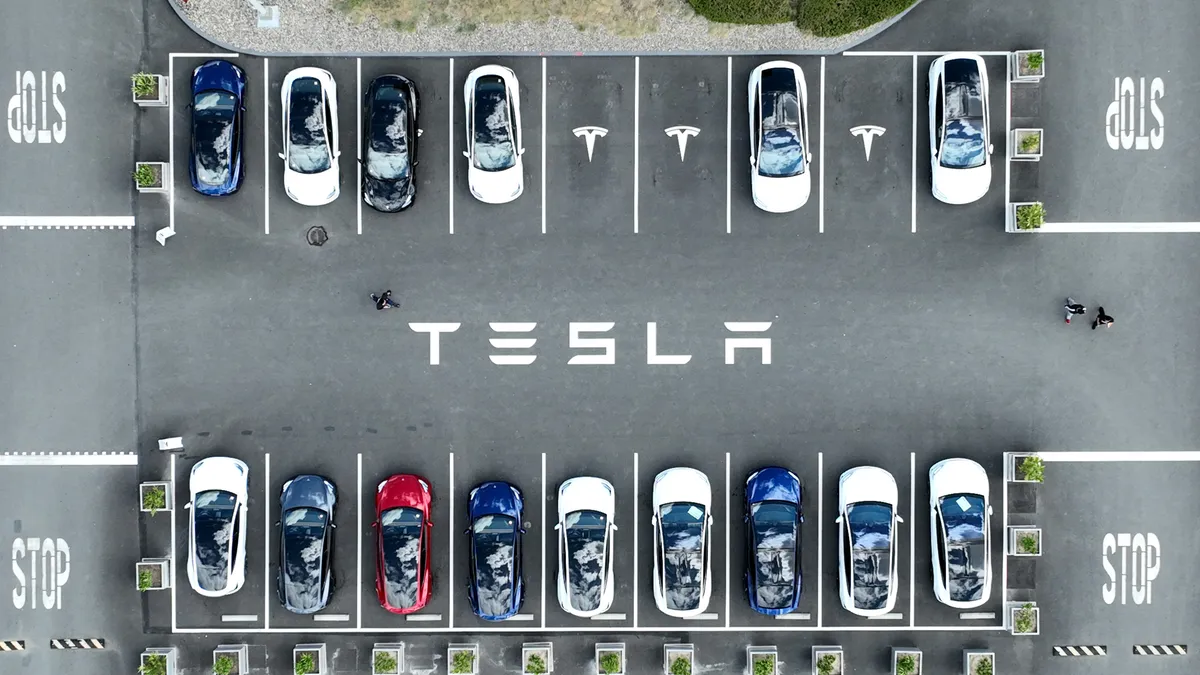Dive Brief:
- Slashing the prices of its electric vehicles failed to bolster Tesla’s most recent quarterly results, leaving the EV maker facing tightening margins and dwindling market share as well as a murky economic environment where consumers may be less likely to buy new cars.
- The Austin, Texas-based company reported a 52% dip in operating income for Q3 2023 to $1.7 billion, while operating expenses jumped by 43% to $2.4 billion, according to earnings results released Wednesday. Lower prices for its vehicles, rising research and development costs related to its CyberTruck product and its investments in artificial intelligence technology, and factory closures all played a role in the EV maker’s slumping profitability, with a boost in sales to offset its price reductions failing to materialize.
- Tesla executives including CEO Elon Musk pointed to the high interest rate environment as a factor in its decision to slash prices. “I just can’t emphasize this enough that [for] the vast majority of people buying a car is about the monthly payment,” Musk said Wednesday during the company’s earnings call. Therefore, if “interest rates remain high or if they go even higher, it’s that much harder for people to buy the car, they simply cannot afford it.”
Dive Insight:
Musk expressed concerns over the high interest rate environment multiple times during the company’s earnings call Wednesday, painting a gloomy economic and geopolitical picture: given the wars and conflicts occurring globally, “buying a new car tends not to be top of mind” for consumers, he said.
Tesla began slashing the prices of its vehicles, including its Model Y and Model 3 offerings, in markets globally in the beginning of the year, with its latest round of price cuts occurring earlier this month after the company reported third quarter deliveries of 435,059 vehicles, CNBC reported. This missed analyst expectations and represented a drop from the 466,140 deliveries made in its second quarter.
However, given the high rate environment — the Federal Reserve has hiked rates to a range of 5.25% and 5.5%, a 22-year high — the cost of a Model Y is nearly unchanged when compared to how much a consumer’s monthly payment has risen, Musk said Wednesday.
Tesla has attempted to balance its price adjustments by subsequently reducing its costs, but there is “an inherent lag in cost reductions, which in turn impacts margins,” newly-minted Tesla CFO Vaibhav Taneja said Wednesday, echoing Musk’s concerns regarding interest rates. The EV maker’s operating margin contracted to 7.6% for the third quarter, compared to 17.2% in the prior period. It also reported weaker than expected revenues of $23.3 billion, a 9% rise year-over-year.
Taneja, who previously served as the EV maker’s chief accounting officer, took Tesla’s top financial seat following the departure of 13-year Tesla veteran Zachary Kirkhorn from the role. Kirkhorn left the company in August following a four-year tenure as CFO, walking away with a net worth of $590 million, CFO Dive previously reported.
Zeroing in on the company’s margins and price cuts should be a critical concern for Taneja as CFO, Dan Ives, managing director and senior equity analyst at Wedbush Securities, recently told Fortune — with missed delivery numbers and an uncertain economic environment, it’s not “exactly roses and champagne time” for the new incoming CFO investors will be looking to vet, Ives said.
The company’s quarterly results also come as Tesla struggles to hang on to its position as the dominant player in the EV market. Tesla’s EV market share slipped to 50% this quarter despite record sales in the segment overall, according to a report by Cox Automotive released last week before the company’s earnings, its lowest share on record and a decline from its 62% share in the year’s first quarter.
Musk’s affordability comments come as the executive takes yet another stab at monetizing social media service X, formerly Twitter, which Musk purchased for $44 billion last year. X will be rolling out a $1 subscription fee, which would impact new users of X in New Zealand and the Philippines, as an addition to the $8 “Twitter Blue,” and now “X Premium” subscription made available on the social media site last year, Slate reported.
Musk — who remains the world’s richest man despite a $16 billion slip thanks to a drop in Tesla stock following the company’s Q3 earnings, with a net worth of approximately $230 billion, according to Forbes — also took the time Wednesday to once again share his thoughts regarding remote work. The billionaire noted that there are “some real Marie Antoinette vibes” coming from individuals who ask why everyone can’t work from home in a seemingly abrupt pivot from an analyst question regarding price elasticity.
“What about all the people that have to come to the factory… or all the people that have to go to the restaurant and make your food and deliver your food,” he said, echoing earlier comments — and an earlier comparison to Marie Antoinette — about remote work made to CNBC in May. “It’s like, what are you talking about — I mean, how detached from reality does the work from home crowd have to be, while they take advantage of all those who cannot work from home.”












